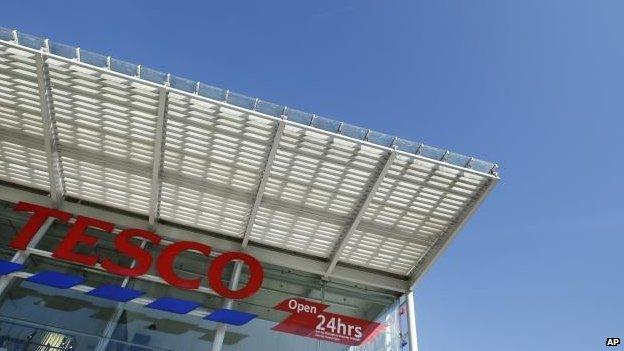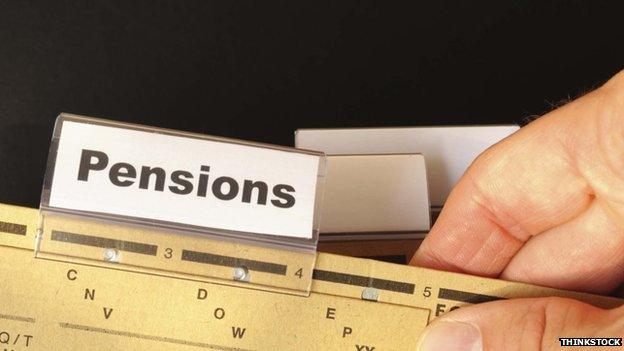Tesco staff facing pension threat
- Published

Tesco has just announced the worst results in its history
Tesco staff are being sent details of a plan to replace its "generous" pension scheme, following other big names which have cut back on the employer benefit.
The retailer has announced the worst results in its history - a statutory pre-tax annual loss of £6.4bn.
It confirmed it was in consultation with staff about replacing its defined benefit pension scheme with a defined contribution scheme.
Retail union Usdaw said it would fight for a "good pension provision".
Tesco wants to close its defined benefit pension scheme - which guarantees a pension based on earnings and length of service - to new members and for existing members' future accrual.
This means that, should the change happen, all entitlements to date would be preserved, but staff would then move to a defined contribution scheme.
These schemes are generally less generous and the size of the pension pot depends on the success of the investments the money is put into.

Pension schemes explained
Final-salary scheme: Guaranteed pension based on earnings at end of your career and length of service. Often known as defined benefit schemes
Career average scheme: Guaranteed pension based on your average pay over your career. Also a form of defined benefit scheme
Defined contribution scheme: Determined by contributions and investment returns. Usually worth less than final-salary pensions. Savings can be used to buy an annuity, or retirement income. New powers now also allow retirees to cash in this pot for a lump sum

Sign of the times

The demise of defined benefit pensions has been clear in the private sector
Malcolm McLean, of pension consultants Barnett Waddingham, said the move could have been predicted.
"The current scheme is one of the best, if not the best, on the market, offering Tesco employees a guaranteed risk-free (to them) way of accumulating valuable pension provision for their later lives," he said.
"Tesco is now clearly going through a difficult patch in terms of its business affairs and is looking to improve its profitability and reduce costs on a number of fronts.
"Against this background and in the face of rapidly growing funding deficits it is hardly surprising that this very lucrative pension scheme may have to follow the example of many others in the private sector and ultimately close down."
Hardly any defined benefit schemes are available to new staff joining the biggest companies in the UK, unlike the public sector.
More than 80% of large employers offered a defined benefit scheme for new hires 15 years ago, a report by pension consultants Towers Watson found.
Now, 97% of the FTSE 350 companies surveyed only offer a defined contribution scheme to new staff members.
Of those still offering some kind of defined benefit provision, most only offered career average or cash balance benefits rather than traditional final salary pensions.
UK focus
Tesco is planning to make the move away from defined benefit after revealing that its net pension deficit after tax increased from £2.6bn a year ago to £3.9bn.
Employees in the UK, the Republic of Ireland, Thailand and South Korea all have access to a defined benefit scheme at the moment, with 95% of the defined benefit pension scheme deficit coming from the UK scheme.
They will be asked for their views during a three-month consultation.
The company has also come up with a plan to pay £270m a year to try to reduce this UK deficit and to meet the expenses of the scheme.
Pauline Foulkes, national officer for retail union Usdaw, said: "We understand that everyone will be disappointed about the proposed changes to the defined benefit pension scheme. Usdaw's priority will be to maintain good pension provisions for all Tesco staff."